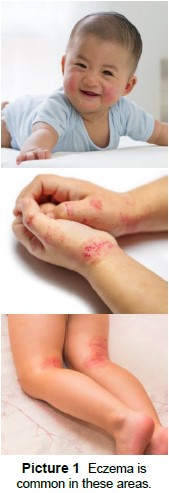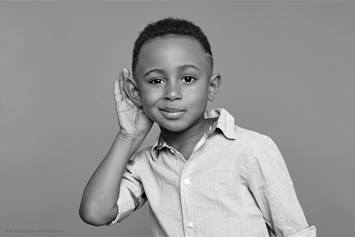Eczema
Eczema (ECK zem uh) is a chronic (long term) dry, itchy skin condition that often runs in families. Eczema is not contagious (does not spread from person to person).
With eczema, dry, rough patches come and go. Eczema often affects the insides of elbows, backs of knees, and the face. It can also cover the entire body. In infants, eczema often appears on the cheeks and around the mouth from excessive drooling. During flare-ups, seeping or crusted sores may develop.
Itching is a symptom of eczema that is very challenging. Itching can make your child irritable. Scratching can cause open sores that may lead to a skin infection. This can make eczema worse.
Skin Care
-
Bathe daily for 5 to 10 minutes. Use lukewarm water. Hot water can cause dry skin.

-
Do not put any soap in the bath water. Only use a small amount of soap at the end of the bath. Do not use perfumed soaps. Use a mild soap or skin cleanser, such as Aveeno®, Cerave®, Cetaphil®, Dove® for Sensitive Skin or Vanicream® (Picture 1).
-
Apply a thick, bland moisturizer to your child’s skin within 3 minutes of bathing while the skin is still slightly damp. You can apply bland moisturizers (cream or ointment) several times a day. A moisturizer such as Aquaphor®, Aveeno® Cream, Cerave® Cream, Cetaphil®Cream, Eucerin® Cream, Vanicream® or Vaseline® works well.
Triggers
Allergies, asthma and eczema may occur together. Allergies can worsen eczema, but allergies, including food allergies, do not commonly cause eczema. If you notice the eczema is worse when your child eats certain foods, avoid these foods and contact your child's doctor. A pediatric allergist should do allergy testing if possible.
Pollen, dust and grass can be environmental triggers. However, keeping a child away from these can be very hard and does not give much relief to eczema.
Scratching can worsen eczema and increase risk of infection. Keep your child's fingernails and toenails clean and cut short. This keeps the child from scratching and causing infections.
Many things can contact and irritate the skin and cause eczema to flare. Triggers may change over time.
These are several common triggers:
-
Harsh soaps
-
Cigarette smoke
-
Saliva
-
Nickel
-
Harsh fabrics (such as wool)
-
Illness, including common colds
-
Perfumed or harsh cleaners. Wash all clothes and bed linens in a mild detergent.
Medicines for Eczema
We cannot cure eczema, but we can help control it. Eczema often improves with age.
Topical (on the skin) medicine. Your child’s doctor may prescribe anti-inflammatory medicines like corticosteroids and calcineurin inhibitors. These may be adjusted to find the best plan for your child.
-
Apply twice a day in a thin layer to the raised, rough, itchy areas of eczema only.
-
Apply a bland moisturizer (described above) over the prescription medicines. Continue to apply moisturizer to all skin including areas without eczema. Keep all skin as healthy as possible with a good moisturizer. This will help your child’s eczema overall.
-
Putting on too much medicine or applying it more often than prescribed can cause side effects such as thinning of the skin.
-
Medicines are prescribed based on the location and thickness of the eczema. You may have more than one kind of medicine. Follow the doctor’s directions carefully.
Oral (by mouth) antihistamines. These help control itching and lessen sleep problems. Often a doctor will prescribe one medication for the morning and a different one at bedtime. These are to be used as needed for itching. Nighttime antihistamines usually make children drowsy.
When to Call the Doctor
Call your child’s doctor if:
-
Your child has severe itching that interferes with sleep.
-
Your child’s skin looks like it is infected. Signs of infection include:
-
Pain (instead of itching) in areas of eczema
-
Many open sores on the skin
-
Drainage and crusting of skin sores
HH-I-104 2/82, Revised 3/17 Copyright 1982 Nationwide Children’s Hospital


